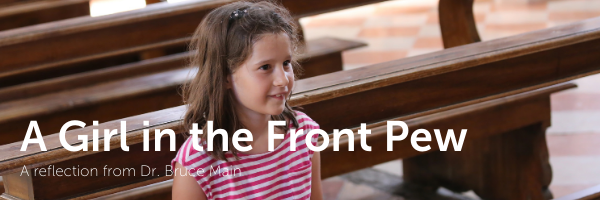February 28th 2021
A Month to Mercy
“Let the little children come to me...”
Matthew 19:14
So I was intrigued when Reverend Hedgis walked into my office—wearing her clerical collar—to share her desire to volunteer. I’d known Sarah tangentially through friends. This was our first official meeting.
After the normal introductory musings, I asked her about her faith journey—and how she decided to become a priest. I was curious.
“We were raised Methodist,” she began.
“That’s odd,” I chuckled. “How did you end up an Episcopalian?”
“We grew up in Georgia and attended a very large church,” she continued. “Generations of my family were members. We even had a pew with a plaque on it.”
One day her father announced that he had taken a job in a little town 5 hours away from the city. Population 400. The local Methodist Church had only 20 members—on a good Sunday. Overnight Sarah went from a community that knew and loved her—a place where she was an insider—to a place where nobody knew her.
“I heard my first sermon when I was nine,” she reminisced. “At our new church there was no youth program, no Sunday school. We just sat through the whole service. I claimed the front pew.”
During the service Sarah took notes on the back of the church bulletin. While most children draw and play tic-tac-toe—as I did during my childhood—Sarah really listened.
“I remember thinking it was so cool to see someone stand in a pulpit, talk about God and have people listen.”
So Sarah jotted notes every week: “Pretty boring sermon today.” “I didn’t know the Bible said that....” “Doesn’t that contradict what Pastor said last week?” “This is really confusing?” “Swallowed by a whale, really?” After service Sarah discarded her comments on the pew.
What Sarah did not realize is the pastor’s wife collected her notes, accumulating a small pile. One day she delivered the pile to her husband.
“Sarah,” beckoned Pastor McNeil Sunday after service. “Can we talk for a moment?”
“Now Pastor McNeil was a towering figure,” recollected Sarah. “He really seemed like a giant. I couldn’t imagine why he’d want to speak to me.”
For the next hour Pastor McNeil flipped through the stack of old bulletins and Sarah’s comments. Intently he listened, even asked more questions and took notes himself.
“Would you be interested in critiquing my sermons after church each Sunday?” he asked as they concluded their initial conversation. "Your feedback is helpful to me.”
And so for the next few years Sarah scribbled notes and shared them with Pastor McNeil. If he missed the point, she told him. If the message really connected, she affirmed him. If she had questions or doubts, she confided.
“There were a lot of voices in my community claiming that women had no place as pastors,” reminisced Sarah. “I could have easily listened to those voices. Had I listened, I would have never studied religion. Never become a priest.”
And so Sarah’s calling and vocation is birthed by an alternative voice: a pastor who took the questions and comments of a nine-year-old girl seriously. In an era of megachurches, social media, and pastors who keep their professional distance from those they lead—time to take the unfiltered truth of a child seriously seems...rare.
In his listening this pastor did what pastors are actually supposed to do: help people identify their God-given passions and gifts. Help people find their voice. By simply listening and validating Sarah’s questions, he awakened a thirst to dig deeper into those questions. It’s made her an amazing preacher and teacher today. It’s helped her become a priest who listens and discerns God’s path for others' lives.
I believe that the meaning of certain words are best understood with the context of human action. We often call those actions stories. A word like “mercy” can be debated, parsed and defined. But when we see merciful behavior displayed by attentiveness to a child’s scribbles and opinions, there’s something to notice.
“But the wisdom from above is first pure, then peaceable, gentle, willing to yield, full of mercy and good fruits, without a trace of partiality or hypocrisy,” writes James.
I think James may have been describing Pastor McNeil.


